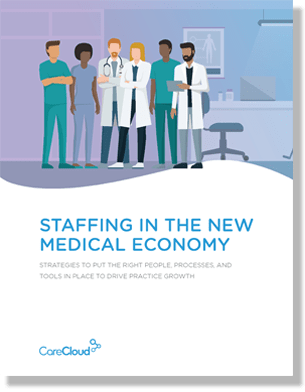Will ‘big data’ change the way health care is delivered? All signs are pointing to the healthcare industry serving as big data’s next big frontier, which could lead to a more connected and complete healthcare experience.
Health care has been traditionally delivered by one doctor examining one patient at a time, with whatever information has been made available at the moment of the appointment or session. So how can big data revolutionize the way your practice interacts with patients?
More Decisive Doctors
Big data can facilitate better clinical decision-making for physicians, seeing as it gives them access to a much larger volume of medical data. Not to mention, big data will help healthcare providers and other professionals at your practice make sense of amorphous medical journal data, x-ray images and doctor’s notes.
Imagine your practice as it is now, but with access to thousands of patient records at your fingertips. This can enhance decisiveness, allowing you to foresee precursors to certain medical conditions, particularly when dealing with low frequency symptoms and diagnoses.
Personalized Care
Naturally, this access to data translates to personalized medicine. The greater specificity of data allows your practice to zero in directly on a patient’s entire health history, without relying on hypotheticals or using other patients with similar conditions or prognoses as examples.
The goal is for healthcare providers at your practice to digitally analyze every patient’s individual chemistry. “Big data actually enables personalized medicine,” said IT consultant Shahid Shah in a recent eWeek.com article. “[Meaning] you need sophisticated data management.
Big data allows for a true departure from health care’s ‘one-size-fits-all’ approach, allowing your practice to mold approaches depending on individual patient situations.
Remember Watson?
In the very near future, computers like IBM’s Watson will facilitate the relationships between humans and big data, simplifying pattern recognition within datasets and facilitating collaboration in every field.
A 2011 Tech Trends report by IBM subsidiary DeveloperWorks reveals Watson’s advanced data analytics capacities could revolutionize health care, according to data collected from 4,000 IT professionals from 93 countries and 25 industries.
VP of IBM startups and ISVs, Mike Riegel, agrees, telling eWeek that “data analytics will have a profound impact on health care moving forward as it represents an important way to finally make sense of the volume of health care data.”
If last year’s HHS Medicare Shared Savings Program initiative to provide incentives for accountable care organizations (ACOs) based on health outcomes is an indication of the industry’s changing business model, then data-analytics tools like Watson become even more important for measuring performance.
Tech-Savvy Patients
Patients strapped with smart phones, tablets and laptops could also speed things along. Innovative companies like 23andMe, Fitbit and PatientsLikeMe are encouraging people to share their medical data, which would help move medical care along tremendously.
However, the key is to get run-of-the-mill patients to share their medical information voluntarily. Considering patient privacy concerns, how can your practice incentivize voluntary disclosure of patient information in situations where benefits to the individual aren’t very clear?
Although this is a modern issue, it should be treated in the traditional, patient-doctor phase of medical care. Physicians are very influential during the nuclear phase of this relationship, and explaining the benefits of data collection to their patients – especially patients who trust your practice after years of visits – can help move big data initiatives along tremendously.
So what’s the incentive? It’s inherent. Without better health, patients won’t be able to cash in on life’s other incentives.
How is your practice preparing for the big data takeover?

